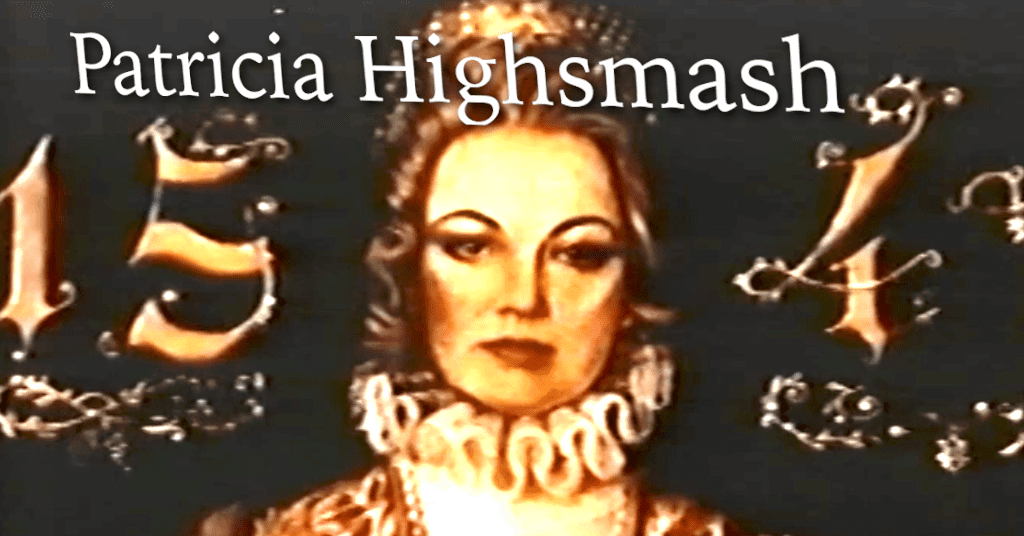Patricia Highsmash
Dracula Ought to Be Weird: Mama Dracula
by Travis Hedge Coke
Louise Fletcher is Mama Dracula!
Trains! Pseudo-documentary! The Statue of Liberty growing fangs! Louise Fletcher bringing all the energy of her One Flew Over the Cuckoo’s Nest and Star Trek: Deep Space Nine energy! That and more in only the first five minutes of this profoundly unserious and seriously profound (not really, but go with us) motion picture!
Within a dozen minutes, we have homoerotic content of male and female persuasions. We have gags rooted in the original Bram Stoker novel,
Countess Dracula has convinced an academic to travel to her castle for a conference, complete with welcome signs and velvet ropes, but there are no other scientists at this “blood congress.” Those who are into blood attend, but they are queer vampires in their high fashion and highfalutin.
Camp vampire man throwing his velvet cape around, playing with his identical double, exclaiming, “I am the bat! I am the bat!” until the double falls into play and they perch in the rafters, flap their capes, screech and caper. Are they gay? Are they twins? Brothers? Replicants?
Mama Dracula is the effect of standing between mirrors, queues of replicated parodic increasingly strange and uncountable images creating a shiver of discomfort and a wealth of warm familiarity.
No wonder Fletcher’s Dracula needs psychoanalysis and fidget toys.
Dracula with dozens of houseplants around her home, well-kept. Dracula playing with crystal balls, with objet petit a.
Fletcher’s affected accent, her mannerisms, the little shakes she does, the disaffection followed by unanticipated intensity are refigured in Grace Zabriskie’s Inland Empire performance nearly thirty years later. It follows on earlier Dracula performances, but it highlights aspects of those we are quick to forget in the earlier portrayals. What she enhances, along with what she adds, creates a panoply, a cache of tools for later actors to draw from.
It makes us ask what we expect and what we want in Dracula, as person, as terror, as story and affect.
Treading a more careful line between parody and earnestness than Dracula Dead and Loving It or the most po-faced version you can think of, it accepts that there is, by necessity, a queerness and a theatricality, a camp to Dracula. If you do not camp it yourself, it will be camped for you by audience and nature. Someone has to howl. Someone has to show off.
At some point, the movie transforms into a montage of bared breasts, a collation of titties fangs titties fangs over jaunty music. Then, we are back to slow, studied, unnaturally jerky and still gestures. Pondering muzak. Ponderous waiting.
As humans become increasingly children, the childlike vampires take on an role of savvy, cognizant adulthood in this mirror-mad fantastical world of department stores, security cameras, trick doors and foyers. The actual child, a precocious Little Orphan Annie simulacrum, sorts the entire plot in seconds and her reward is to be slapped and ignored by her mother. There is a sacristy to deliveryman and farm girl jokes, stating the obvious, the dropping of victims down inefficient laundry chutes, and devising new cinematic and special effects raison d’etre for blouses to rip.
This is how Dracula lives. This is what keeps Dracula alive. Farce. Blood. Sex. Friction. Machination. And, the turned eye of faked maturation.
“They will see what they will see!”
With those words dialogue stops mattering. Words and exchanges of words stop affecting anything. They are only affectation.
This is dream. This is the pitch and fit, the wah and ebb of dreams. Not nightmare. Not fever or pleasure dream. Dream accompli. What once was door is now bars of a cell. Where had been love, now playing cards and music slapped down by traveling locals. The mirrors cease to reflect and refract and lie in them inlaid in them trompe l’oeil.
Everything is face, gesture, expression and color. Virginia may no longer be a virgin, but we could tell looking.
